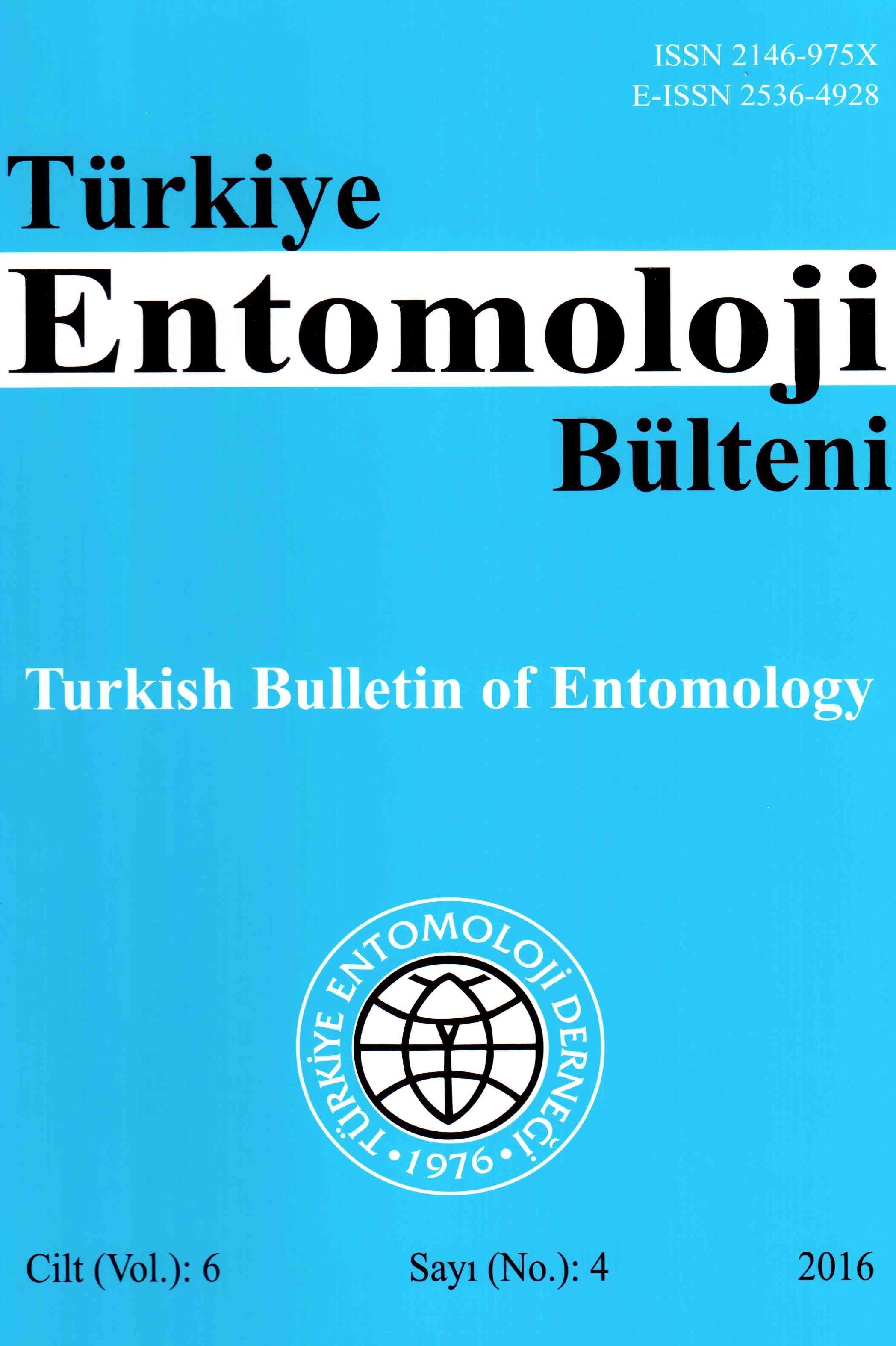Bazı pestisitlerin laboratuvar koşullarında avcı böcek Nesidiocoris tenuis Reuter (Hemiptera: Miridae)’e karşı etkileri
Bitkisel üretimde kimyasal savaş, insan ve hayvan sağlığı ve çevre üzerine olumsuz etkileri de olsa en fazla kullanılan yöntemlerden birisidir. Buna alternatif bir yöntem olan biyolojik mücadele ve bu mücadelede de kullanılabilecek doğal düşmanlara en az zarar veren pestisitlere öncelik verilmesi entegre mücadele çalışmalarının temel prensiplerindendir. Bu kapsamda, avcı böcek Nesidiocoris tenuis’e IOBC standartlarına göre laboratuvar şartlarında yürütülen çalışmada spinosad, pyriproxyfen, bakıroksiklorür, cymoxanil+propineb ve dimethoate olmak üzere toplam 5 bitki koruma ürününün bu doğal düşmana karşı yan etkileri kuru film yöntemiyle araştırılmıştır. Dimethoate etkili maddeli pestisit yüksek derecede (%100), Spinosad, orta derecede (%72,9) zararlı olurken, pyriproxyfen, bakıroksiklorür, cymoxanil+propineb sırasıyla, %18.1, %5.0 ve %13.1 oranında etkili olduğu ve entegre mücadele yapılan seralarda ruhsat dozunda kullanılması durumunda N. tenuis’e herhangi bir zararının bulunmadığı tespit edilmiştir.
Anahtar Kelimeler:
Nesidiocoris tenuis, örtüaltı, IOBC, yan etki, biyolojik mücadele
Effects of some pesticides on predator Nesidiocoris tenuis Reuter (Hemiptera: Miridae) under laboratory conditions
The most common method in control of pest and diseases in agriculture are pesticide applications though it is known to harmful for human being, animal and environment. One of the alternative methods for this chemical control is the biological control and applied pesticide which harmless to the natural enemies and they are the basic principles of the integrated pest management practices. In this context, side effects of 5 plant protection products: spinosad, pyriproxyfen, copper oxychloride, cymoxanil+propineb and dimethoate were evaluated with dry-film method against predator Nesidiocoris tenuis under IOBC guidelines. Dimethoate was determined highly harmful (100%), the side effect of spinosad against N. tenuis was evaluated as moderately harmful while pyriproxyfen, copper oxychloride, cymoxanil+propineb which were evaluated causing 18.1%, 5.0% and 13.1% respectively, N. tenuis individuals under laboratory condition and determined that they have no effect to N. tenuis if they used at registered dose.
Keywords:
Nesidiocoris tenuis, greenhouse, IOBC, side effect, biological control,
- ISSN: 2146-975X
- Başlangıç: 2011
- Yayıncı: Türkiye Entomoloji Derneği
Sayıdaki Diğer Makaleler
Türkiye faunası için yeni bir kayıt: Chrysocharis gemma Walker (Hymenoptera: Eulophidae)
İsmail KARACA, Ali KAYAHAN, Betül ŞİMŞEK, Mustafa AVCI
Ramazan CANHİLAL, Fatmanur BORAZAN, Yunus ÖZDEMİR, Sevim DOĞAN, Gizem EŞGİN
Türkiye’den Oxycera (Diptera: Stratiomyidae) cinsine ait üç yeni kayıt
Turgay ÜSTÜNER, Abdullah HASBENLİ, Üzeyir ÇAĞLAR
Cycas palmiyelerinin kaçak yolcusu; Aulacaspis yasumatsui Takagi (Hemiptera: Diaspididae)
